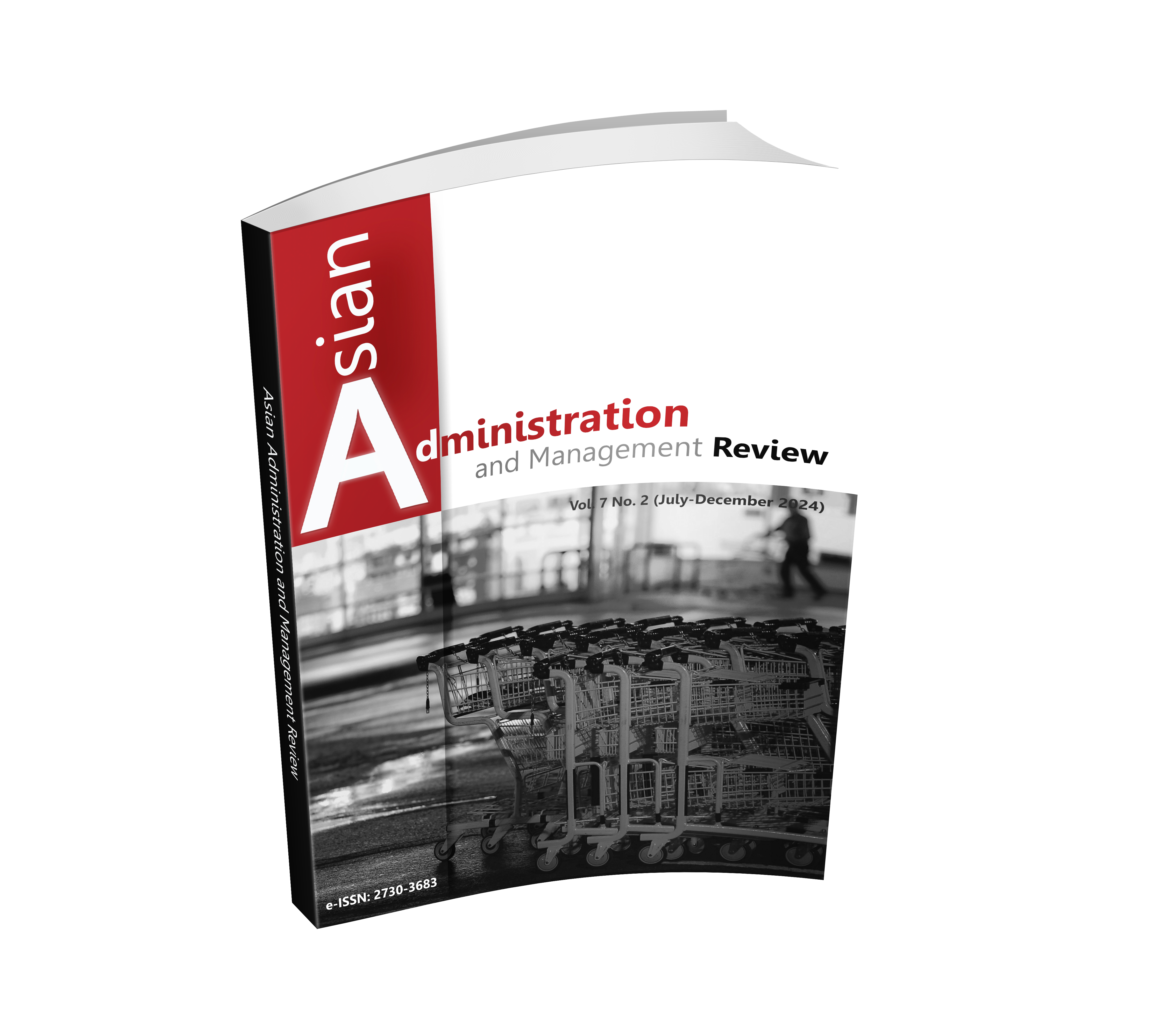MARKETING MIX FACTORS AFFECTING THAI TOURISTS’ DECISION TO PURCHASE INTERNATIONAL TOUR PACKAGES
DOI:
https://doi.org/10.14456/aamr.2024.29Keywords:
Marketing Mix Factors, Thai Tourists, International Tour PackagesAbstract
This research aims to 1) study the travel behavior of Thai tourists influencing their decisions to purchase international travel packages, and 2) analyze marketing factors that influence Thai tourists' decisions to buy international travel packages. It is a mixed-methods study with a population of Thai tourists aged 20 and above who have previously purchased international travel packages, totaling 385 respondents. Convenient sampling and online questionnaire distribution methods were used, with an IOC of 0.97 and a reliability coefficient of 0.945 for data analysis. Statistical methods employed include descriptive statistics such as frequency, percentage, mean, and standard deviation, as well as inferential statistics like t-test, ANOVA, regression analysis, correlation analysis, and component analysis. Qualitative research utilized purposive sampling of 9 key informants who are executives or business owners of leading travel companies in Thailand, analyzed through content analysis. Findings reveal that 1) most tourists are female, aged 31-40 years, with education below a bachelor's degree and a monthly income of 30,001-40,000 THB. Tourists prioritize information search and comparison before making decisions, with word of mouth playing a significant role, while advertising and publicity have minimal impact. 2) Significant factors influencing purchase decisions include physical evidence, place, price, people, and creating positive experiences, comprehensive information provision, and promotion of word of mouth, enhancing the likelihood of Thai tourists' decisions to purchase international travel packages effectively.
Downloads
References
Bolarinwa, O. (2015). Principles and methods of validity and reliability testing of questionnaires used in social and health science researches. Nigerian Postgraduate Medical Journal, 22(4), 195-201.
Braun, V., & Clarke, V. (2006). Using thematic analysis in psychology. Qualitative Research in Psychology, 3(2), 77-101.
Castillo-Montoya, M. (2016). Preparing for interview research: The interview protocol refinement framework. The Qualitative Report, 21(5), 811-831.
Cochran, W. (1977). Sampling techniques. (3rd ed.). New Jersey: John Wiley & Sons.
Creswell, J., & Plano Clark, V. (2018). Designing and conducting mixed methods research. 3rd ed. New York: SAGE Publications.
Creswell, J., & Poth, C. (2018). Qualitative inquiry and research design: Choosing among five approaches. 4th ed. New York: SAGE Publications.
Department of Consular Affairs. (2023). Visa facilitation for Thai tourists. Bangkok: Ministry of Foreign Affairs.
Etikan, I., Musa, S., & Alkassim, R. (2016). Comparison of convenience sampling and purposive sampling. American Journal of Theoretical and Applied Statistics, 5(1), 1-4.
Giaoutzi, M., & Nijkamp, P. (2018). Tourism and regional development: New pathways. London: Routledge.
Hair, J., Black, W., Babin, B., & Anderson, R. (2019). Multivariate data analysis. (8th ed.). Massachusetts: Cengage Learning EMEA.
Han, H., Lee, S., Kim, J., & Ryu, H. (2020). Coronavirus disease (COVID-19), traveler behaviors, and international tourism businesses: Impact of the corporate social responsibility (CSR), knowledge, psychological distress, attitude, and ascribed responsibility. Sustainability, 12(20), 8639.
Kallio, H., Pietilä, A., Johnson, M., & Kangasniemi, M. (2016). Systematic methodological review: Developing a framework for a qualitative semi-structured interview guide. Journal of Advanced Nursing, 72(12), 2954-2965.
Kim, J., Cui, Y., Choi, C., Lee, S., & Marshall, R. (2020). The influence of preciseness of price information on the travel option choice. Tourism Management, 79, 104012.
Kotler, P., & Armstrong, G. (2021). Principles of marketing. (18th ed.). New Jersey: Pearson Education.
Kotler, P., & Keller, K. (2016). Marketing management. (15th ed.). New Jersey: Pearson Education.
Kotrajaras, P., Songprasit, P., & Piriyakul, R. (2020). The effect of marketing mix factors on international tourists' decision to visit Thailand. Journal of Environmental Management and Tourism, 11(2), 462-472.
Kotzé, T., & van der Merwe, K. (2022). The influence of the marketing mix on tourist satisfaction and loyalty: The case of a South African national park. Journal of Outdoor Recreation and Tourism, 37, 100458.
Laoumnuay, P. (2016). Tourism marketing. Bangkok: Thammasat University Press.
Liang, X., & Xie, L. (2022). The effect of consumer-to-consumer interaction on tourism experience: The mediating role of travel planning. Journal of Destination Marketing & Management, 24, 100702.
Likert, R. (1932). A technique for the measurement of attitudes. Archives of Psychology, 22(140), 1-55.
Merriam, S., & Tisdell, E. (2016). Qualitative research: A guide to design and implementation. (4th ed.). New Jersey: Jossey-Bass.
Muangnoi, B., Pradabthanakit, D., & Vorratanakomon, S. (2021). Factors influencing Thai tourists' decision to purchase domestic tour packages. Dusit Thani College Journal, 15(2), 283-297.
National Research Council of Thailand. (2019). Thailand's national ethical guidelines for human research. Bangkok: National Research Council of Thailand.
National Statistical Office of Thailand. (2024). Statistical yearbook Thailand 2024. Bangkok: National Statistical Office of Thailand.
Nowell, L., Norris, J., White, D., & Moules, N. (2017). Thematic analysis: Striving to meet the trustworthiness criteria. International Journal of Qualitative Methods, 16(1), 1-13.
Patton, M. (2015). Qualitative research & evaluation methods: Integrating theory and practice. (4th ed.). New York: SAGE Publications.
Rezvani, M., Gharakhani, D., & Mirzaei, H. (2021). The effect of marketing mix on customer satisfaction and loyalty in the tourism industry: A case study of Iran. International Journal of Tourism Research, 23(5), 791-804.
Samruad, J. (2022). Price war strategies in the Thai tourism industry: Impacts and implications. ABAC Journal, 42(2), 1-15.
Smith, S., & Kelly, C. (2020). Tourism trends: Lifestyle developments and the links to solo tourism. Journal of Tourism Futures, 6(3), 251-255.
Solomon, M. (2014). Consumer behavior: Buying, having, and being. (11th ed.). New Jersey: Pearson Education.
Song, H., Dwyer, L., Li, G., & Cao, Z. (2012). Tourism economics research: A review and assessment. Annals of Tourism Research, 39(3), 1653-1682.
Srimai, N., & Khonkaen, T. (2020). The impact of marketing mix factors on decision-making in Thai tourists' purchase of foreign travel packages. Dusit Thani College Journal, 14(2), 235-251.
Tan, Z., & Su, J. (2020). An empirical study of the factors influencing Chinese tourists' purchase intentions towards Thai tour packages. Journal of Asian Finance, Economics and Business, 7(11), 933-943.
Tanathon, S., & Wongsuwan, M. (2012). Marketing factors influencing purchasing decision toward tourism package: A case study of Thai tourists. RMUTT Global Business and Economics Review, 7(2), 1-12.
Tourism Authority of Thailand. (2023). Tourism statistics. Retrieved from www.tat.or.th/en/tourism-statistics/.
Vanniarajan, T., & Vijayakumar, V. (2021). Impact of marketing mix elements on destination image, tourist satisfaction and loyalty: A study on Tamil Nadu tourism. International Journal of Tourism Cities, 7(2), 459-474.
Wang, J., & Li, X. (2019). The impact of destination image on tourist behavioral intentions: The moderating role of perceived risk. Journal of Destination Marketing & Management, 14, 100386.
Wang, Y., & Xu, W. (2020). Does tourism lead to economic growth? Empirical evidence from China. Journal of Policy Research in Tourism, Leisure and Events, 12(2), 184-201.
Wen, J., Kozak, M., Yang, S., & Liu, F. (2021). COVID-19: Potential effects on Chinese citizens' lifestyle and travel. Tourism Review, 76(1), 74-87.
Wittaya, S. (2014). Tourist behavior. Nonthaburi: Sukhothai Thammathirat Open University Press.
Wongdee, P. (2019). Factors affecting tourism decision-making behavior of Thai tourists: A case study of seaside tourism in Trat province. Ramkhamhaeng University Journal, 38(1), 95-110.
Wongkaew, T., & Indharapairoj, A. (2021). The impact of low-cost carriers on outbound tourism demand in Thailand. Journal of Air Transport Management, 93, 102048.
Yeong, M., Ismail, R., Ismail, N., & Hamzah, M. (2018). Interview protocol refinement: Fine-tuning qualitative research interview questions for multi-racial populations in Malaysia. The Qualitative Report, 23(11), 2700-2713.

Downloads
Published
How to Cite
Issue
Section
License
Copyright (c) 2024 Authors

This work is licensed under a Creative Commons Attribution-NonCommercial-NoDerivatives 4.0 International License.











.png)


